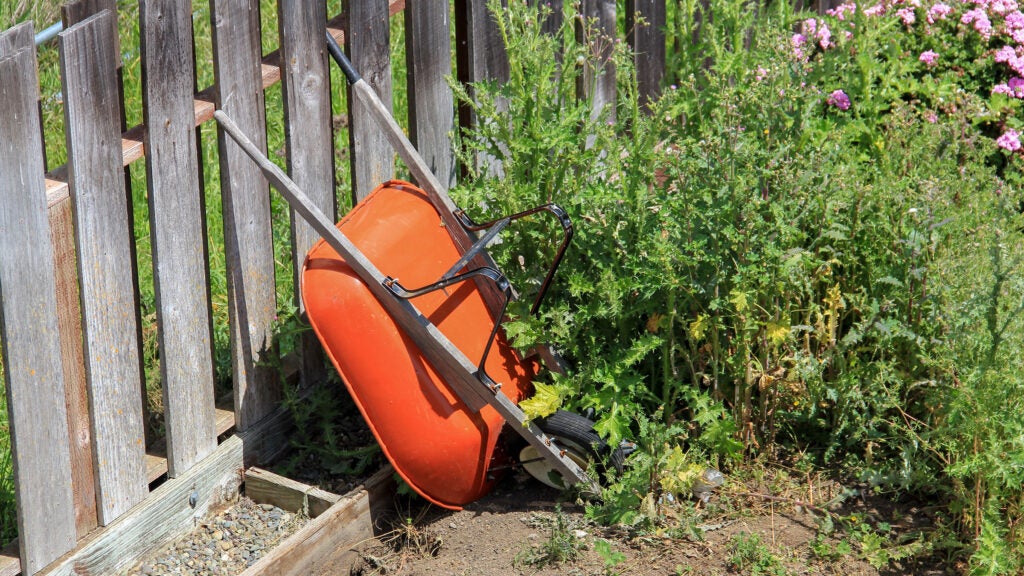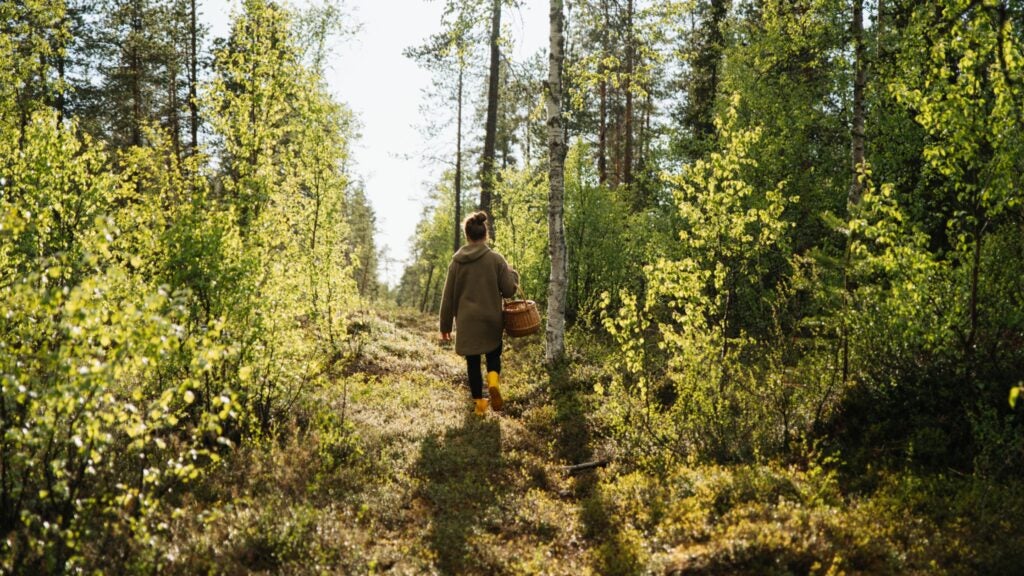
The primary facet yard I can recall—the one belonging to my childhood house in South Carolina—had one notable characteristic: a tall plant, presumably tropical, judging by the rubbery leaves. These leaves grew in tubes, on the backside of which might pool rainwater. Each heat morning, I’d run exterior, pull down the leaves, gaze into their throats, and discover frogs squatting inside like little inexperienced uvulas.
Entrance yards add curb attraction, and backyards add consolation—patio furnishings, umbrellas, grills, fireplace pits. However what’s a facet yard if not the out of doors equal of a hallway, main from one true yard to a different? Aspect yards are scraps of property—hardly the place to come across magnificence or significance. But their existence on the periphery permits them to shock us. My first encounters with the pure world occurred in modest facet yards, sliding these frogs into my cupped fingers, quietly popping hosta buds between my finger and thumb, watching ant lions snare their prey in tiny craters of sand.
In 1955, Rachel Carson, the marine biologist who impressed the trendy environmental motion, wrote “The Marginal World,” an essay through which she described the unusual great thing about coastlines. Like a starfish in a single seashore cave reaching for its good reflection in a tide pool, Carson noticed herself mirrored within the alien lifetime of pink molluscs and gelatinous anemones, slowly gathering in herself “a robust sense of the interchangeability of land and sea… and of the hyperlinks between the lifetime of the 2.”
Shoreline natural world are marginal in a literal sense, however Carson additionally noticed how all of nature usually occupies the margins of our consideration, simply out of focus, regardless of our deep connection to it. Aspect yards are among the many finest examples of this phenomenon: tiny ecosystems can flourish exactly as a result of these areas entice much less of our consideration. Not way back, for instance, my dad and mom had been shocked to find a small warren of rabbits burrowed of their slim and in any other case featureless facet yard.
Some would possibly object to the comparability of the facet yard to such majestic environments as Carson described. The boundary separating human-subdued property from true nature could be stark: the author Annie Dillard famous a literal, barbed wire boundary parting a pasture stuffed with steers—or “beef,” as she known as them—from the close by wilderness that impressed her masterpiece, Pilgrim at Tinker Creek. However the boundary could be blurrier than Dillard makes it out to be. My very own facet yard in Louisville, Kentucky holds what she would possibly’ve known as the waterway-equivalent of beef: the culvert. Water dribbles steadily (or, throughout storms, flows torrentially) from a pond in a close-by neighborhood into the culvert that runs beneath our avenue and onto our property. It’s no Tinker Creek, however it’s our creek.
And certainly, within the thick rushes and across the roots of the old-growth willow dipping its fronds into the present, frogs and crawdads congregate; a duck hen, her fuzzy brood trailing elliptically behind her, treks up and down the financial institution day by day; turtles, together with a monstrous snapper, make annual appearances, as do numerous birds, snakes, and an enormously fats groundhog. As I watch the bustle, I’m reminded of Thoreau’s contemplation: “A lot is printed, however little printed.”
That is our facet yard—extra lush than many, however awkward nonetheless. The grass declines steeply to the water, too steeply for my two sons, aged 5 and 7, to make use of for any typical goal: taking part in catch, or that form of factor. Frankly, even discovering a spot flat sufficient to sit down comfortably is a problem. But the boys neglect their extra typical yard—full with a trampoline, numerous balls, and a play kitchen—to spend hours within the facet yard, digging worms from the clayey soil, squatting on the bridge I constructed of wooden scrap final summer season, counting the frogs sheltering on the mucky financial institution. They uncover the odd leech on their toes and gleefully pluck it off like a small, black fruit. Final week, for the primary time, the boys every held a crawdad. And every jumped, startled, when the little crustacean snapped its tail as loudly as I can snap my fingers.
In contrast to our back and front yards, our facet yard is essentially uncontrolled, and that bit of untamed fills the observer with anticipation. The highly effective pump of a crawdad’s tail, the thrust of frogs’ legs; what continues to be for hours can explode in a second into sensible movement. The identical is true of the backyard my spouse and I’ve begun to domesticate alongside that ungainly slope above the creek. We scatter seeds, and a few alchemy between the soil, the climate, and people tiny pods produces flowers as tall as me. Maybe that is what so captivates my kids concerning the yard, concerning the outdoor basically: potential power.
Alas, people interrupt this idyll. Bottles and empty chip baggage accumulate among the many reeds, and farther down the stream, the place one other culvert contributes to the move, spray-painted obscenities adorn the concrete. My boys are already sounding out these obscenities—they’re principally single-syllable phrases, in any case. We could not litter or paint curse phrases on partitions, however we aren’t exempt from judgment. The very presence of our home has displaced lots of the creatures that when inhabited this small hill we dwell on—foxes and the like. Thoreau as soon as in contrast a distant practice’s whistle to the scream of a hawk. We’re predators, he appeared to say, even when solely accidentally.
However nature can flourish regardless of our efforts on the contrary. E.O. Wilson, the celebrated entomologist and nature author, found as a baby 4 species of ants within the empty lot beside his Alabama house, together with one total colony underneath a discarded glass whiskey bottle. Poet Elizabeth Bishop described catching a fish and discovering 5 hooks, their traces damaged, lodged in his decrease lip “like medals and their ribbons.” Famously, she let the fish go.
I don’t imply to attenuate the harmful capability of people, however reasonably to remind us that nature is highly effective, miraculous even.
More and more, although, the time we spend exterior—even in our yards—is dwarfed by the point we spend interfacing with know-how, the instruments we’ve created within the pursuit of good productiveness. That infinite pursuit is altering us, encouraging us to see ourselves as little greater than advanced machines. One has solely to peruse the self-help shelf at any given bookstore to see the machine logic prescribed to all imperfect passersby: optimize the inputs to supply extra fascinating outputs.
We after all aren’t above enlisting the pure world in our quest to resolve our difficult selves. A current article in a serious publication advisable birdsong as a way of bettering our psychological well being. That is merely an extension of machine logic: that nature is nice, however we are able to enhance its results on us by abstracting its finest options—birdsong, say—and extra strategically inputting them into our lives (maybe through studio-quality headphones!). Again yards, like birdsong, ship consolation. However these pesky facet yards—our marginal world, to borrow from Carson—refuse to be so simply instrumentalized.
I really like my facet yard as a result of it tells this completely different story about us people. Nature is at all times turning into, a lot as we, as constituents of nature, are additionally at all times turning into. Whereas our know-how decays, we develop—and as we do, we discover extra in widespread with the allium or the salamander than with machines in fixed want of restore or substitute.
I usually consider the Torah’s creation narrative, through which God created from adama, the bottom, adam, humankind—naming us, roughly translated, groundlings. Many non secular traditions have such tales. Carson noticed herself mirrored dimly in marine life, however she was common: even probably the most ardent materialists have, to make use of the phrases of the poet Wallace Stevens, “discovered inklings of [our] bond to all that mud.”
Once I sit (uncomfortably) in my facet yard throughout springtime, when the Lenten Roses have overwhelmed each different flower to bloom and the willow is leafing out too early to be known as prudent, the expertise is like non secular ecstasy or a vivid dream: no quantity of description or recorded neurochemical exercise can seize it. Sitting in that little patch of inexperienced—persisting inside and regardless of the slow-spreading sprawl of homes, the grid of asphalt, the limitless net of wires—I really feel for a short second one thing unusual and unsure: an inkling of what I’m meant to be.
Supply Hyperlink : appkswspace.com

